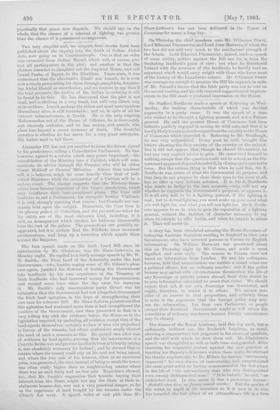Sir Stafford Northcote made a speech at Ketteriug on Wed-
nesday, the leading characteristic of which was decided. pugnacity in a party sense. It was the speech of a man, who wished to be thought a fighting general, and not a Fabian, general. He said the present House of Commons had been' hitherto publicly engaged in sowing its wild oats, and that it is hardly likely to earn so m uchrespect from the country as th e House of Commons which preceded it. Referring to Mr. T3radlaugh, he was very enigmatical. Every post, he said, brought him letters showing the deep anxiety of the country on the subject.. But it slid not appear that, though he shared the anxiety, he had any very explicit advice to give. He committed himself to nothing, except that the question could not be solved, as the Go- vernment appeared disposed to solve it, by closing one's eyes to the issue. But the curious thing is that when he said this, Sir S. Northcote was aware of what the Government do propose, and that they do not propose to close their eyes to the issue at all, but to offer a very definite solution. It is Sir S. Northeote• who wants to hedge to the last moment,—who will not say whether he supports the Government's proposal, or opposes it. It is all very well to be a fighting general, if the lighting is real ; but to do real fighting, you must make up your mind what you will fight for, and what you will not fight for. Sir S. North- cote appears to us to wish to gain the reputation of a fighting geueral, without the decision of character necessary to say when ho intends to offer battle, and when he intends to refuse. it. That will never do.


































 Previous page
Previous page